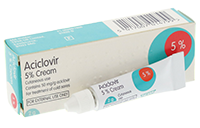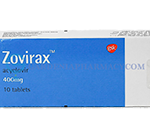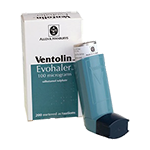
Aciclovir

What is Aciclovir?

It is a drug that can kill the viruses responsible for some infections called “herpes” generically. It does not cure the infection definitively but reduces the time needed for the body to control it and shortens the time for healing of the lesions. The drug does not prevent the transmission of the virus to other people and does not serve against other common viral diseases such as the flu or the cold: it is active only in “herpes virus” infections.
The use of Aciclovir is indicated for:
- Treatment of Herpes zoster virus (HSV) infections in adults;
- Prevention and treatment of recurrent HSV eye infections in adults and adolescents over 12 years of age;
- Prevention and treatment of skin infections due to Herpes simplex virus (HSV) and treatment of genital herpes in adults and adolescents over 12 years of age;
- Treatment of cold sores;
- Prevention of Cytomegalovirus (CMV) infections after organ transplants in adults and adolescents over 12 years of age.
Mechanism of action
Aciclovir is a structural analogue of the guanosine nucleotide. It is phosphorylated in vivo only in cells infected by the virus, which codes for the enzyme thymidine kinase, which, in fact, is the enzyme that catalyzes the phosphorylation of acyclovir.
In this way the selectivity of the action of the drug on the infected cells is obtained, without it acting at the level of healthy cells.
Acyclovir is further phosphorylated to form acyclovir triphosphate. The latter binds and inhibits the viral DNA polymerase (a key enzyme for the replication of the virus within the cell). In particular, it acts as a competitive inhibitor of viral polymerase, preventing the binding of deoxyguanosine triphosphate, with which it shows structural similarity. Acyclovir is incorporated into the newly formed DNA strand and causes an error in the DNA replication process, preventing further replication of the virus in the cells of the host organism.
Uses and dosage
Tablets
The drug should be taken by mouth during meals, usually 5 times a day, with a distance of 4 hours between one administration and another, or according to the doctor’s prescription. The drug should generally be continued for 5-7 days, unless otherwise prescribed by the doctor, based on the disease to be treated or prevented. If you miss a dose, take it as soon as possible and take the next dose according to the schedule indicated by your doctor.
Vials
Inject, after appropriate dissolution of the powder, only by slow venous infusion (at least an hour), carried out by authorized health personnel. Do not inject intramuscularly or subcutaneously.
The reconstituted solution should be used immediately after preparation.
Cream
The drug should be applied to the affected area, at the onset of the first signs (redness, sensation of “discomfort”), 5 times a day (every 4 hours), until the symptoms disappear (5-10 days).
Aciclovir directions
Store Aciclovir at room temperature, in a cool place (under 25 C) and dry and away from light. Do not use the drug if the label indicates that it has expired. Keep it away from children. Store the medicine in the original package together with the package insert.
Aciclovir vs Valaciclovir

Valaciclovir is a prodrug, which means that – before carrying out its antiviral action – valaciclovir must be converted through hepatic metabolism into its active metabolite which is acyclovir.
Valaciclovir is more absorbed at the gastrointestinal level than its active metabolite acyclovir. Therefore, the oral administration of valaciclovir allows to reach higher plasma concentrations of acyclovir than those that could be obtained by administering acyclovir as such.
Aciclovir vs Penciclovir
Penciclovir is an active ingredient with extensive antiviral activity, particularly effective against Herpes Simplex Virus. Applied to the area affected by the infectious process, Penciclovir easily permeates the membranes of infected cells, being phosphorylated to Penciclovir triphosphate first by specific viral enzymes and then by cell kinases.
The antiherpetic activity of Penciclovir is inferior to that of Aciclovir, the difference in the drugs’ effectiveness which is especially pronounced in patients with immune deficiency. This is explained by Penciclovir weaker ability to inhibit the DNA essential in Herpes virus replication, polymerase. Penciclovir, however, has proven efficacy against HSV-2. Laboratory tests should be carried out before your prescriber approves for application of either of the drugs, but Aciclovir features a broader spectrum of actions.
Aciclovir vs Abreva
Abreva (doconasol) is an OTC drug administered in labial herpes patients. Abreva is unique in the meaning that it is the only non-prescription antiviral drug used for the treatment of this condition alongside with other similar medications. Abreva is available in form of cream and oral tablets.
Abreva, unlike Aciclovir, is a non-prescription drug. Its efficacy is less intense, and it has a milder effect compared to Aciclovir. Abreva can be used in initial stages of the disease, but is not recommended to be used if the disease has become chronic.
Aciclovir vs Doconasol
Doconasol is the nonproprietary name for Abreva, the OTC drug described above. Compared to Aciclovir, it produces a milder action and is available without prescription in form of topically applied cream or oral tablets.
The recommendations described for Abreva apply: Doconasol should be used as a therapy in milder forms of the viral infection.
Aciclovir vs Ganciclovir

Ganciclovir is an antiviral drug capable of interfering with DNA replication of viruses. From the chemical point of view, ganciclovir is an analogue of deoxyguanosine, one of the nucleosides that makes up DNA. Ganciclovir is marketed as pharmaceutical formulations suitable for ocular and intravenous administration.
The use of Ganciclovir is indicated for:
- Treatment and prevention of infections caused by cytomegalovirus in patients with impaired immune defenses (intravenous administration);
- Prevention of cytomegalovirus infections following organ transplants (intravenous administration);
- Treatment of superficial eye infections caused by viruses (ocular administration).
The drugs have similar effects and mechanisms, which makes them interchangeable. In studies, both drugs have shown the same efficacy, but Aciclovir was reported to have fewer side effects.
Side effects
They are rare but nausea, vomiting, diarrhea, headache, feeling of drunkenness, confusion, agitation, tremors, rash, hives, itching and fatigue have been reported as side effects of Aciclovir.
Precautions
Concomitant administration of oral or intravenous acyclovir and cimetidine (a drug used to reduce acid secretion of the stomach) or probenecid (a drug used to treat gout) may decrease the elimination rate of aciclovir and increase it accordingly , plasma concentration.
In any case – regardless of the type of pharmaceutical formulation based on acyclovir that is used – it is always good to inform your doctor if you are taking, or have recently been, any type of medication, including medicines without a prescription. and herbal and / or homeopathic products.
- In elderly and renally impaired patients, a reduction in the dose of aciclovir usually administered orally and intravenously may be necessary.
- In addition, elderly patients and patients with renal insufficiency are exposed to a greater risk of occurrence of side effects affecting the central nervous system, in which connection, they must be constantly monitored.
- Patients receiving high-dose oral aciclovir should drink sufficient amount of water to maintain hydration.
- Aciclovir can trigger the onset of adverse events that can affect the ability to drive and / or use machinery, so care should be taken.
- If you suffer from genital herpes, a condom should be used during sexual intercourse to prevent the transmission of the virus to your partner.
Contraindications
It will be necessary to carefully check the composition of the aciclovir-based drug that you will take because it is the composition of the latter that will determine possible contraindications. Regarding the active ingredient alone, any allergy to Aciclovir is a contraindication, and any liver problems or dehydration should be reported to your doctor to adapt the treatment accordingly.
Posted in Anti Viral
(1 voices, average: 5 of 5) 3785 views
Personally, I also prescribe herbal therapies that increase the system of defenses, given that the disease is due to extreme exhaustion (for example, Echinacea, Astragalus, Copper-gold-silver trace elements), which help the patient recover first. I recommend that you talk to your trusted dermatologist.






















